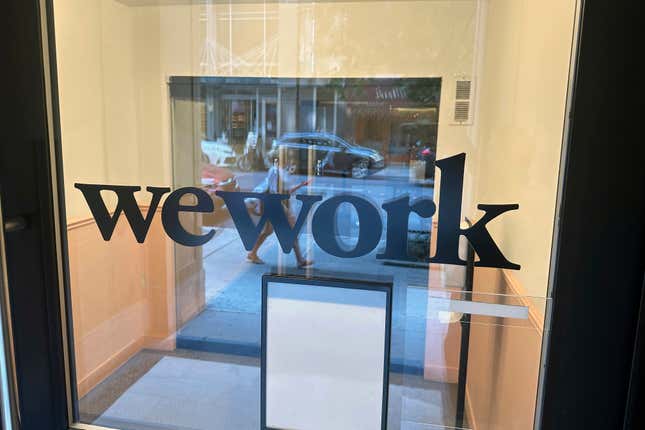
NEW YORK (AP) — WeWork has filed for Chapter 11 bankruptcy protection, a stunning fall for the office-sharing company that once promised to upend the way people went to work around the world.
The filing comes at a time of incredible disruption in the commercial real estate market. The COVID-19 pandemic led to a spike in vacancies and major markets, from New York to San Francisco, are still struggling.
But it was an aggressive expansion in WeWork's early years, that led to the bulk of its current troubles. The company went public in October 2021 after an attempt two years earlier collapsed spectacularly. The debacle led to the ouster of founder and CEO Adam Neumann, whose erratic behavior and exorbitant spending spooked early investors.
Despite efforts to turn the company around since Neumann’s departure — including significant cuts to operating costs and rising revenue — WeWork has struggled in a commercial real estate market that has been rocked by the rising cost of borrowing money, as well as a shifting dynamic for millions of office workers now checking into work remotely.
“I feel like (WeWork) has been imploding in slow motion,” said Nicole Schmidt, an attorney and managing partner at investment banking firm Oberon Securities.
Sam Chandan, director of the Chao-Hon Chen Institute for Global Real Estate Finance at New York University’s Stern School of Business, also pointed to WeWork's rapid expansion — and said it's important to separate its current situation from the future of various co-working models as a whole. He said overall demand for co-working space is expected to remain healthy and in some cases grow, but there are different models for delivering it.
There’s also rising competition in the flexible-office industry, and that includes some legacy office landlords competing directly with co-working space providers today, Chandan said.
New York-based WeWork said it has entered into a restructuring agreement with most of its stakeholders aimed at slashing its debt, while it looks to trim its commercial office lease portfolio.
The agreement is expected to erase about $3 billion of WeWork’s debt, CEO David Tolley told The Associated Press Tuesday.
It's not clear how many WeWork locations will remain open. In the most recent filing that included numbers, the company said it had 777 locations in 39 countries.
Tolley said he expects WeWork to exit additional locations as talks continue with landlords — but hopes to leave as few as possible. The company says it plans to stay in the vast majority of its current markets.
The specter of bankruptcy has hovered over WeWork for some time. Shortly after sounding the alarm over its business prospects this summer, the company announced plans to renegotiate nearly all of its leases in September. But cracks had begun to emerge several years ago, not long after the company was valued as high as $47 billion.
Japan’s SoftBank stepped in to keep WeWork afloat, acquiring majority control over the company. WeWork shareholders are largely wiped out though SoftBank, which owns nearly 80% of the equity distributed in the company, is likely still in negotiations after losing billions of dollars.
Lease liabilities, which account for about two-thirds of WeWork's operating costs, continue to be the company’s "primary challenge,” Tolley said — noting the company's need for “a more efficient footprint.”
Landlords with exposure to WeWork could take significant hits if their leases are terminated.
Beyond real estate costs, WeWork has pointed to increased member churn and other financial losses.
But despite rising competition and lingering uncertainty following Monday's bankruptcy filing, the company still has half a million members.
Daniel Oberhaus, CEO and founder of Haus Biographics, a marketing company that caters to “deep tech” companies, founded his company earlier this year and started working in a WeWork office in Manhattan in March.
“We’re a young company. I started here with just myself working in a co-working space and we’ve grown since to seven people,” he said. “So WeWork, offered us the flexibility to expand offices, roll into new spaces pretty quickly, efficiently.”
Oberhaus added that he’s looked at other spaces but has no immediate plans to leave WeWork. He has been following the WeWork saga though, and says he made sure he had in writing that his deposits are safe.
While the full impact of this week's bankruptcy filing is still uncertain, WeWork sounded an optimistic note.
“In a year, we’re going to be right where we are today. We are open for business for half a million people ... all around the world," Tolley said. "The only difference is a year from now the company will be profitable in a way that it just has never gotten to in the past.”
In Monday’s filing, WeWork listed about $18.7 billion in debts and $15.1 billion in assets as of June 30.
“WeWork as a company may survive, but they’ve got a tremendous amount of baggage,” Schmidt said. “The new management team has to prove that they’re good operators.”
WeWork locations outside of the U.S. and Canada will not be affected by the bankruptcy proceedings, the company said, as well as franchisees worldwide.
___
Associated Press Business Writer Mae Anderson in New York contributed to this report.
___
This story has been updated to correct WeWork’s debts and assets. It reported $18.7 billion in debts and $15.1 billion in assets, not $18.7 million and $15.1 million, respectively.